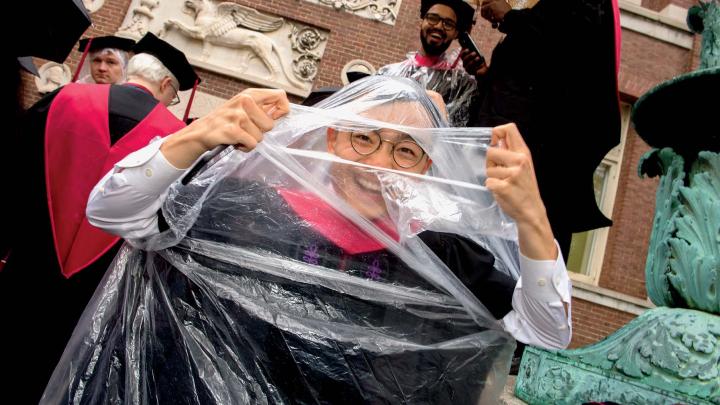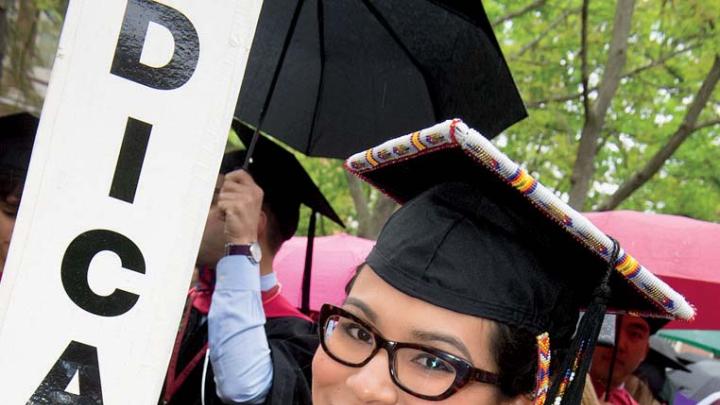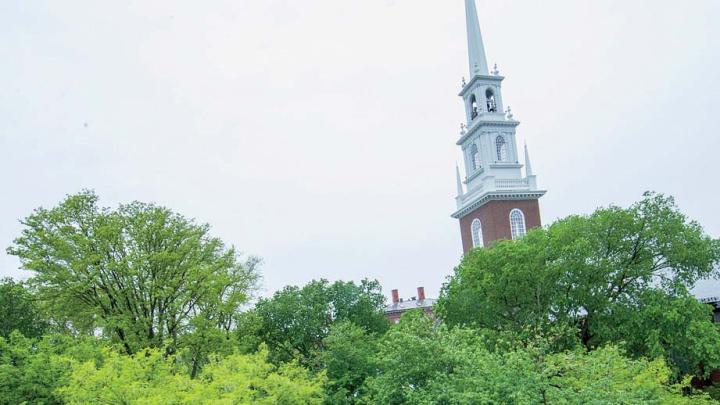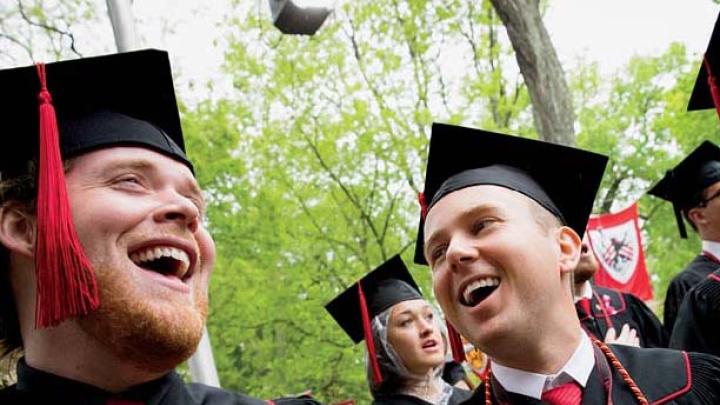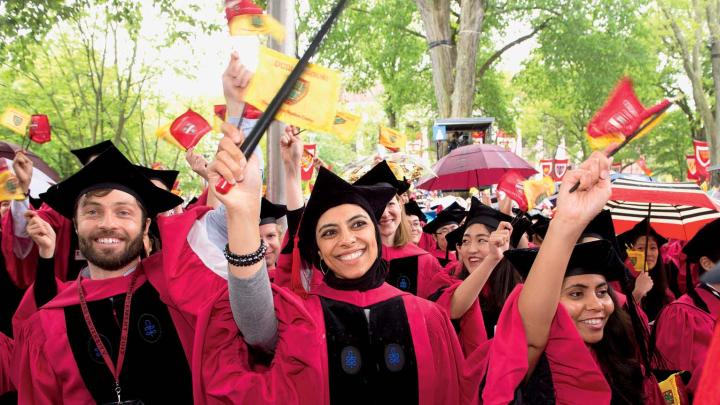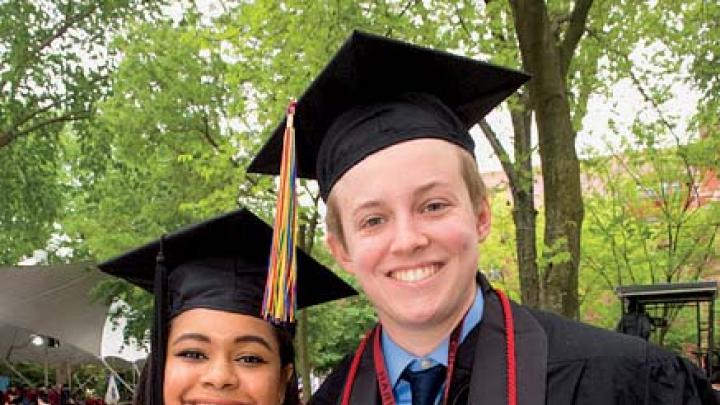Cap and gown: check. Poncho, coat (if available), gloves, scarf, hat (ditto): check. In 2010, when Harvard’s deciders moved Commencement forward from early June, they focused on the delights of late May (and were rewarded with 92-degree heat midweek, leading Baccalaureate supplicants to beg for an air-conditioned Memorial Church—a prayer answered this spring). This year, they got April.
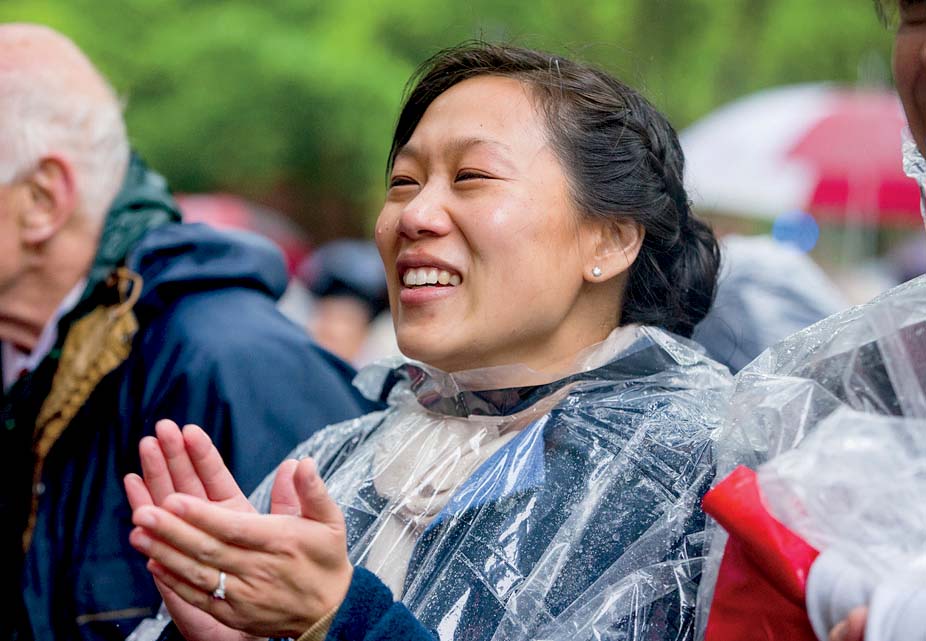
Priscilla Chan ’07 applauds her husband, Mark Zuckerberg ’06, LL.D. ’17
Photograph by Stephanie Mitchell/Harvard Public Affairs and Communications
On Thursday, the rain began shortly after 7:00 a.m., and intensified; the temperature never broke the mid 50s. At the Chief Marshal’s luncheon, Alumni Association executive director Philip Lovejoy joked that the relocation from the Lamont Library lawn to Widener Library, effected in 2015, was then welcomed because the new venue was air-conditioned; this year, it provided dry shelter and warmth. After a rain delay (and a merciful shortening of the formalities), the afternoon exercises proceeded with President Drew Faust speaking in a black coat and scarf (see “Commencement Talk 2017”); one wag suggested that the next speaker, newly minted Dr. Mark Zuckerberg, natty in blue suit, white shirt, and tie, revert to form and be provided with a Harvard hoodie. His address, streamed live, was always going to play to a larger audience online; with the physical one dramatically reduced (but loyally including his wife, Priscilla Chan ’07—on hand for her tenth reunion, too—gamely coping in a plastic poncho; see above), the ratio was even more skewed. Friday morning dawned even worse: the overnight deluge tapered to wind-driven rain, but the temperature had fallen to 48 degrees. At least the faucet was turned off for the Radcliffe Day tent luncheon.
Wednesday evening in Annenberg Hall, ending the dinner for honorary-degree recipients, Faust had, hopefully, repeated the old chestnut for the assembled glitterati: “It never rains on Harvard Commencement—even when it rains.” For a champion of Veritas, it seemed a shocking attempt to spread fake news. The meteorologists had not hedged: the official forecast for Thursday read “Chance of precipitation is 100%,” and the scientists clearly won out. Even so, the candidates got their degrees. The venerable rites were plenty festive: Winthrop residents, this year’s campus refugees as their House is being renewed, seemed to have a fine time celebrating with their families, in close quarters, under the tent on Lamont’s lawn (helpfully vacated by the Chief Marshal’s spread to accommodate just this use). So Faust’s larger truth was borne out: mere rain could not drown the spirit of Harvard’s parade.
Nor did it obscure the unusual character of this 366th Commencement. The University always throws a world-class fête during its graduation gala. Rarely, amid the hoopla, does it also display its academic essence: identifying big ideas and great challenges, advancing debate. This year, at a divided moment across the wider world, Harvard pursued celebrations and fruitful conversations about consequential issues.
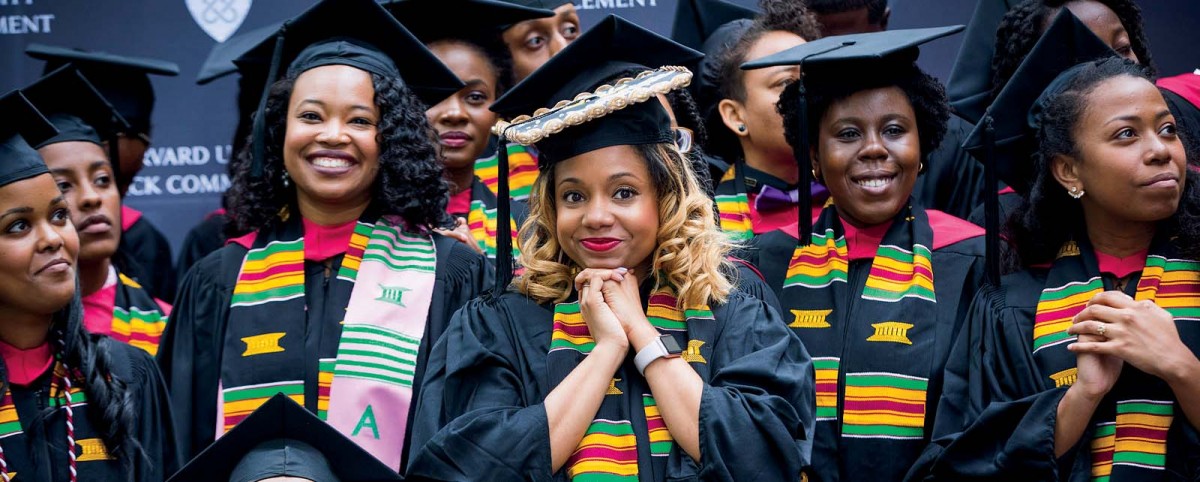
Imminent Ed.M.s Keya Wondwossen, Sara Trail, Rashaida Melvin, Dorothy Mrema, Kidus Mezgebu, Alysha English, Vic Quintanar, Monique Hall, and Tiffini Hyatt take part in Black Commencement.
Photograph by Keith Bedford/ The Boston Globe via Getty Images
The first theme of these campus conversations arose, de facto, in the first formal event of the week. Phi Beta Kappa (PBK) orator Sherry Turkle, who probes the effects of emerging communications media, spoke about her generation’s embrace of digital technology. She certainly had the political context in mind (she talked about reclaiming “our communities, our democracy, and our common purpose”). But her deepest argument was about the corrosive effect of “efficient,” carefully curated social-media posts and e-discourse on the efficacy and empathy engendered in, you know, actually talking with other humans.
These issues were certain to be joined once Facebook CEO Zuckerberg was named the guest speaker at the Thursday afternoon exercises. Introducing him at the honorands’ dinner, Faust uncontroversially said Facebook “has changed how the world works.” In his address, Zuckerberg spelled out his optimistic and expansive vision of “building community across the world” in ways implicitly enabled by his software platform (and presumably others). Related issues, like privacy, are grist for Harvard’s Berkman Klein Center for Internet & Society, whose faculty director, law and computer-science professor Jonathan L. Zittrain, served as the honored guest’s escort.
On Friday morning, the Radcliffe Day panel, on “(Un)Truths and Their Consequences,” was the latest in a series of campus symposiums on fake news (perhaps the most popular subject of concern for such sessions during the spring). Although not specifically Facebook-focused, the social-media channels for disseminating rumor, opinion masquerading as fact, and outright falsehoods (or even more abhorrent material) are clearly implicated. And so, in its informal way, the University managed both to honor an interesting, and globally important, former student while paying him the further tribute of taking what he has wrought very seriously.
A second theme—internally focused, on matters of diversity and inclusion within the University—arose repeatedly. On Tuesday morning, as the venerable PBK exercises celebrated brilliant Collegians, a group of graduate students launched Harvard’s first Black Commencement; at day’s end, the third LatinX graduation ceremony took place. (Kente-cloth and Clase del 2017 stoles were proudly evident during Thursday’s conferring of degrees; see gallery above.)
In her Baccalaureate address Tuesday afternoon, President Faust got laughs with a joke (this works only at Harvard, and only this year) aimed at the “Final Report of the Implementation Committee for the Policy on Membership in Single-Gender Social Organizations”—a reference to the ferocious debate about the sanctions to which the freshmen who enroll this August and their successors will be subject should they join a final club or similar entity. Those disagreements pit inclusion (opposing groups that discriminate on the basis of gender) against free association, professors’ authority to enact policy for students, and the basis on which academic recommendations are made. (In his talk, Zuckerberg gave a shout-out to “the incredible Harry Lewis”—the professor in his first Harvard lecture, Computer Science 121, and former College dean who informally led opposition to the sanctions policy during the faculty’s as yet inconclusive debates.)
As all those currents swirled, the president’s Task Force on Inclusion and Belonging presumably toils along, aiming next year to recommend ways Harvard can build on increased demographic diversity to achieve real inclusiveness among all members of the community. (One of its ideas is discussed in The College Pump; co-chair Danielle Allen—Conant University Professor and a political philosopher very attuned to equality and the quality of discourse—was on the Radcliffe journalism panel.) Faust touched on some of the hard issues facing Harvard in her Thursday afternoon address, on free speech.
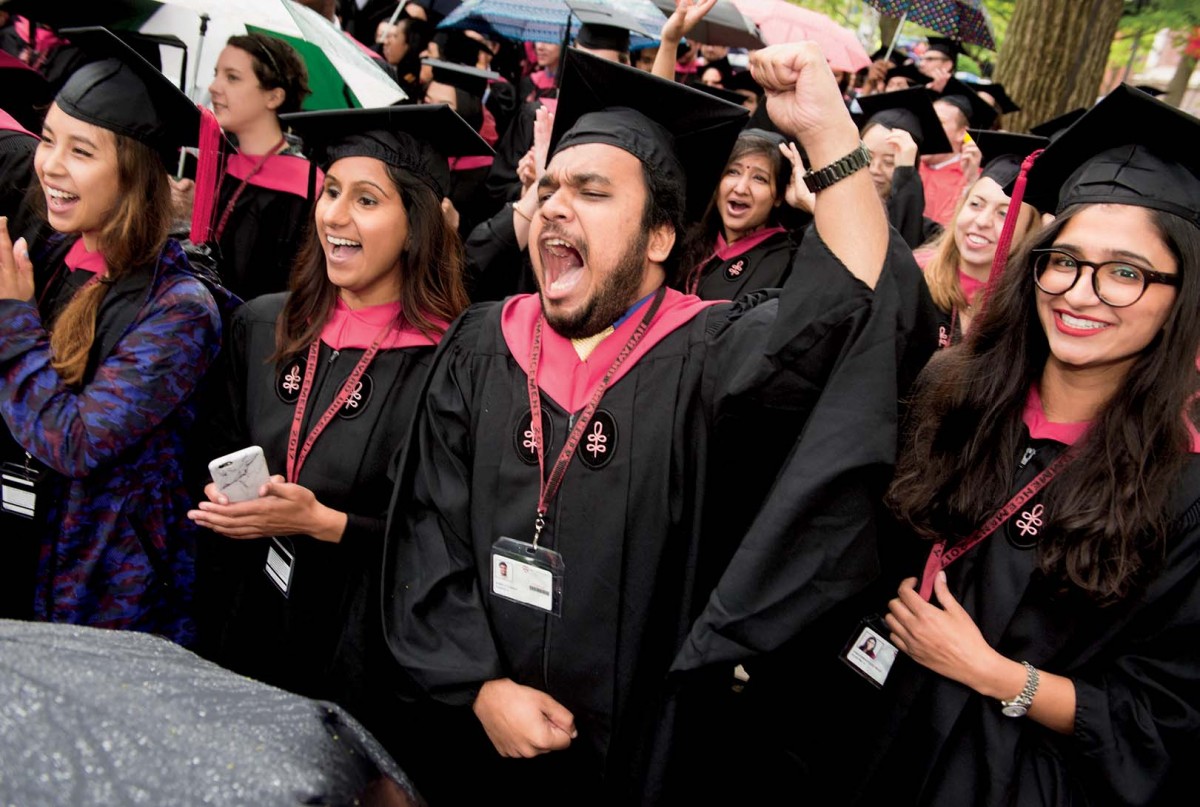
New masters of public health Ashley Cheng, Trush Patel, Namit Choski, and Anu Ghuman exult.
Photograph by Jim Harrison
From an interior focus on diversity and inclusion, it was a small pivot (via fake news and the communities mediated online) to opposite concerns in the wider world beyond: border walls, immigrant bans, and the like. And indeed, the third through-line of this Commencement week was the United States and its global village pre- and post-November 8.
Some of this was subtle. The PBK poet, Mark Doty, nodding toward New York real-estate developers who assume other roles, crafted a new, political work, riffing on “precious glitter,” titled “Air Rights.” Senior English speaker Auguste (Gussie) Jennings Roc ’17 drew on her experiences on 9/11 and during the Visitas weekend disrupted by the Boston Marathon bombing manhunt to affirm that “love and courage trump hate and destruction”—even in a world where there is “fear of deportation, fear of walls and bans.” Graduate English speaker Walter Edward Smelt III, M.T.S. ’17, drew upon the authority of “Rumi, an immigrant from what is now Afghanistan to what is now Turkey, an immigrant from the thirteenth century to our own, a Muslim mystic.” And one of the honorands, Hawa Abdi Diblawe, is herself a brave humanitarian from Somalia—a geographically inconvenient fact that made it more than a little difficult to gain her access to this country, in the wake of President Donald Trump’s (contested) executive orders banning immigration from six predominantly Muslim nations. Zuckerberg choked up while talking about an undocumented high-school student whom he is mentoring—whose identity he felt compelled to protect.
Some of it, inherent in the guests’ identities, was very direct. College Class Day speaker Joe Biden, the former vice president, assured the students that “this condition is temporary,” and summoned better all-American angels: “We’re a nation that has always thought big, not small. I’m so tired of both political parties talking about incrementalism. America has always thought big, and boldly! What has happened to us?” Sally Yates, dismissed from her leadership of the Justice Department for refusing to defend the first executive order on immigration, counseled the lawyers-to-be to be prepared “to decide who you are and what you stand for.” Former secretary of state John Kerry, addressing the Harvard Kennedy School just days before the centennial of the late president’s birth, said that his recent travels had revealed to him a global community “unsettled about the leading nation of the free world…walking away from a century of thoughtful, carefully conceived economic and strategic leadership.” And in Longwood, former Environmental Protection Agency administrator Gina McCarthy told the public-health graduates that citizens hunger for facts and scientific truths, and that when people “speak with very clear conviction in this country, policymakers and politicians—albeit many of them reluctantly—they will listen,” making it imperative for experts to communicate with the public at large.
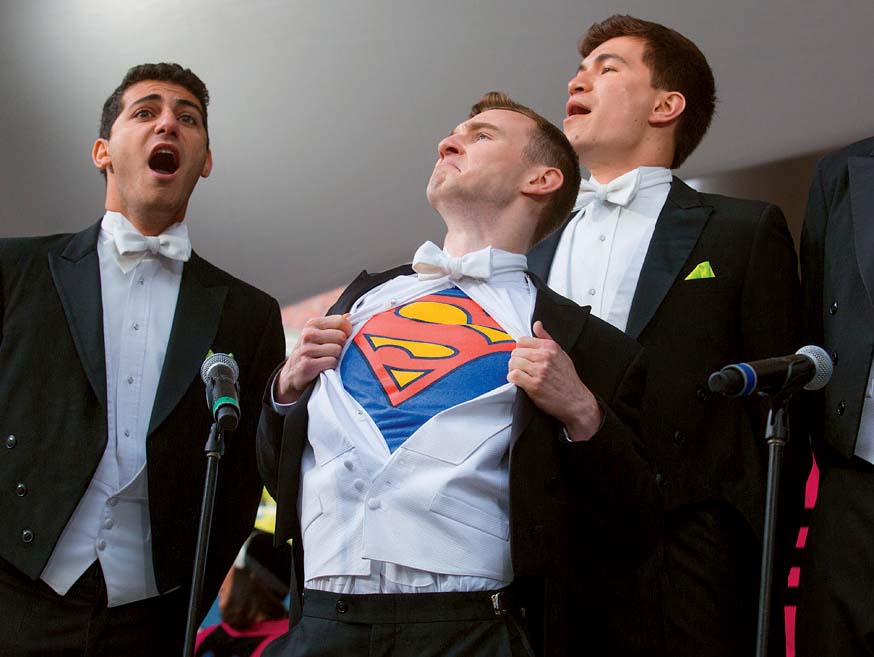
Dins (from left) Jacques Berguig ’18, Brian Rolincik ’18, and James Baskerville ’18 salute honorand John Williams.
Photograph by Jon Chase/Harvard Public Affairs and Communications
There was plenty of fun as well. The morning exercises featured two made-for-video entertainments (a signature of Faust-era graduations). When the provost made to introduce John Williams, he cut his text short so the Din & Tonics could perform an animated a cappella medley of the composer’s famous film scores—an interlude that extended the conferring of honorary degrees to nearly 40 minutes, but probably took the crowd’s collective mind, briefly, off its collective wetness. And after Pusey Minister in Memorial Church Jonathan L. Walton offered the benediction, he then wished, especially for the class of 2017—while ceding to James Earl Jones of the famous voice—“May the Force be with you.” As was noted more than once, Zuckerberg had a Star Wars-themed bar mitzvah, so this alignment of honorands was kismet, or cosmic, or something.
The students were not the only people commencing. Ending, law dean Martha Minow presented her gavel-wielding throng for their degrees for the last time. Beginning, medical and public-health deans George Q. Daley and Michelle A. Williams (identifying herself as “the freshman dean”) performed their formalities for the first time.
At the luncheon in Widener, the Chief Marshal—Massachusetts attorney general Maura Healey ’92—gave Zuckerberg the Kirkland House directory for his entering year, claiming for it the inspiration for his subsequent activities. And then, in a dubiously legal but inspired bit of computer craft, hackers disrupted The Harvard Crimson’s website at the hour appointed for the afternoon exercises, posting contents that were, um, not respectful of the honored guest speaker.
Zuckerberg himself—speaking without a prompter, and seemingly without resorting to his text—began by aiming a number of sharp arrows in his own direction before turning to an expansive exhortation to “create a world where everyone has a sense of purpose.” Acknowledging that this is an “unstable” time, he pushed back against “the forces of authoritarianism, isolationism, and nationalism.” In the sweep of his ambitious vision, and the detailed, emotional precision of his anecdotes, he sounded—despite their differences of origins, age, experience, and means—more akin to Joe Biden than to any other speaker on campus this week.
And perhaps that dialogue across generations was exactly the right thing for the University during Commencement—in 2017, or any other year. Thursday morning, in the gathering drizzle, Law School career-services staffer Paula Garvin, on duty as a monitor guiding her charges to their seats, surveyed the scene thus: “All the rest of the year, it’s just the Yard, but today it has a different pulse. It’s thrilling. People come from all over—the medical school, the law school…it’s like a family coming together. And everyone fits in.” It would take a lot more than rain to wash that Harvard spirit away.
